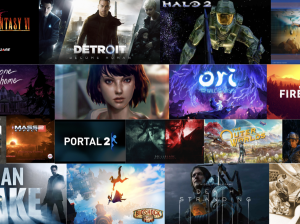Introduction Storytelling has become an essential aspect of modern video games, shaping the way players experience, interact, and connect with the virtual worlds they explore. From simple text-based adventures to sprawling cinematic epics, storytelling in video games has evolved into a sophisticated art form that rivals movies and literature in its ability to captivate and
Introduction
Storytelling has become an essential aspect of modern video games, shaping the way players experience, interact, and connect with the virtual worlds they explore. From simple text-based adventures to sprawling cinematic epics, storytelling in video games has evolved into a sophisticated art form that rivals movies and literature in its ability to captivate and inspire.
The Evolution of Storytelling in Video Games

Image by: Yandex.com
The journey of storytelling in video games began with basic narratives, such as rescuing a princess or defeating an evil villain. Early games like The Legend of Zelda or Pac-Man offered simple stories that served as a backdrop for gameplay. However, as technology advanced, so did the complexity of storytelling.
Titles like Final Fantasy VII and The Last of Us introduced layered plots, deep character development, and emotional arcs, transforming video games into powerful storytelling mediums. Today, games are celebrated for their ability to immerse players in dynamic and thought-provoking narratives.
The Impact of Storytelling on Game Design

Image by: Yandex.com
Storytelling has a big impact on how games are designed. When a game has a strong story, the gameplay, characters, and setting all work together to support that story. Designers carefully create worlds that match the mood of the story. For example, a dark and serious story might have gloomy, detailed environments, while a fun and light-hearted story may have bright and colorful settings. The way the game looks, feels, and plays is often shaped by the narrative, making the experience more immersive for the player.
How Storytelling Shapes Player Choices

Image by: Yandex.com
In many games, players can make choices that affect the story. This creates a sense of control, allowing players to shape the outcome based on their decisions. Games like Mass Effect and The Walking Dead offer different paths that players can take, leading to different endings. These choices help players connect more deeply with the story because they feel like their actions matter. It’s not just about following a pre-made script; players are part of the story and can influence what happens next.
Why Storytelling Matters in Gaming

Image by: Yandex.com
1. Engaging Players Emotionally
Storytelling creates emotional connections between players and characters. Games like Red Dead Redemption 2 and Life is Strange evoke empathy and make players care about the fate of their protagonists.
2. Driving Player Motivation
A compelling story gives players a reason to continue. Whether it’s seeking revenge, solving a mystery, or saving a world, the narrative often fuels the desire to progress.
3. Enhancing Replayability
Games with branching storylines or multiple endings encourage players to replay and explore different outcomes. For instance, Detroit: Become Human allows players to shape the narrative with their choices.
Storytelling Makes Games Feel Real
When a game has a good story, it feels more real to the players. The characters seem like real people with emotions, and the game world feels alive. For example, in games like Red Dead Redemption 2, the story shows the struggles of the characters, making players care about their journey. A strong story makes players feel like they are part of something bigger than just playing a game. It’s this connection that makes players want to keep coming back to the story.
Stories Help Players Escape Reality

Image by: Yandex.com
Many people play games to take a break from real life, and storytelling helps them do that. A good story can take players to magical lands, deep space, or even historical moments. Games like The Elder Scrolls series let players explore huge, detailed worlds where they can create their own adventures. These stories give players a chance to escape everyday life and experience something completely different, offering fun and relaxation at the same time.
The Growing Popularity of Story-Driven Games

Image by: Yandex.com
Over the years, the popularity of story-driven games has increased. As technology has improved, players expect more from the stories in games. They want rich narratives, deep characters, and meaningful choices that impact the outcome. Story-driven games like The Witcher 3, God of War, and Horizon Zero Dawn have set new standards in the gaming industry. As more players demand strong stories, game developers are focusing on creating experiences that feel like interactive movies. This shift has made storytelling an essential part of game development and has helped to push video games into a new era of entertainment.
How Stories Build Communities
Storytelling in games also brings people together. Fans of a game often talk about the story, share their favorite moments, or discuss different endings. Online forums, social media, and even YouTube are filled with people sharing their thoughts and theories about game stories. For example, games like Dark Souls have inspired entire communities to uncover hidden story details. These shared experiences create a sense of community and make gaming more social and fun.
The Role of Art and Music in Stories
Art and music make game stories even better. The visuals of a game show the mood of the story, like dark and scary places for horror games or bright, colorful scenes for adventure games. Music adds to this feeling, setting the tone for each moment. A sad scene might have soft, slow music, while an exciting moment could have fast, upbeat tunes. Together, art and music help the story feel alive and make it easier for players to connect with what’s happening.
The Benefits of Storytelling in Games

Image by: Yandex.com
Storytelling in video games offers many benefits. First, it helps players connect with the characters and world, making the game more engaging. A good story can make players care about what happens next, keeping them hooked throughout the game. It also adds meaning to the gameplay, making the actions feel more important. Additionally, story-driven games can encourage players to explore different choices, which can lead to different outcomes, making the experience feel personal and unique.
1. Connecting with Players Emotionally
Stories make players feel connected to the characters. They care about what happens next and feel involved in the journey.
2. Making Games More Fun
A good story keeps players interested and motivated to finish the game. It adds meaning to the gameplay, making it more enjoyable.
3. Encouraging Replay
Some games let players make choices that change the story. This means they can play again and have a new experience each time.
The Role of Storytelling in Video Games
Storytelling plays a key role in making games more than just entertainment. A well-crafted story creates a world that players want to be a part of, whether it’s saving a kingdom, solving a mystery, or exploring a new planet. The story gives players something to care about, guiding them through the game. In some games, the narrative is as important as the gameplay itself, and the two work together to create an unforgettable experience. Whether it’s a deep character journey or an epic quest, storytelling helps to bring the game to life.
How Stories Change Over Time

Image by: Yandex.com
In some games, the story doesn’t stay the same—it changes as players make choices or as the game is updated. Games like The Witcher 3 let players decide how the story ends, based on their actions. Other games, like Fortnite, add new story events over time to keep things interesting. This keeps players excited and eager to see what happens next. Changing stories make games feel fresh and give players a reason to keep playing for a long time.
Games with Stories Appeal to All Ages

Image by: Yandex.com
Storytelling in games isn’t just for kids or adults—it can be for everyone. Family-friendly games like Animal Crossing tell lighthearted stories that bring joy to players of all ages. On the other hand, games like Cyberpunk 2077 explore mature themes for older audiences. This variety of stories means there’s something for everyone. As more people discover games, storytelling helps make gaming an experience that anyone can enjoy.
Key Elements of Effective Storytelling in Games

Image by: Yandex.com
1. Relatable Characters
Characters that feel real and multidimensional make stories more engaging. Games like The Witcher 3 succeed by presenting flawed but relatable heroes.
2. Immersive World-Building
A well-crafted game world deepens the story’s impact. Elden Ring uses rich lore and stunning environments to pull players into its narrative.
3. Interactivity
The ability to influence a story’s outcome is unique to video games. Choice-based games like Mass Effect empower players to shape the narrative.
4. Strong Themes
Themes like love, loss, or morality add depth to stories. Games like Bioshock explore complex topics, prompting players to reflect on their choices.
Emotional Storytelling in Video Games

Image by: Yandex.com
One of the most powerful aspects of storytelling in games is its ability to evoke emotions. Video games can make players feel joy, sadness, fear, and even anger. A well-written game can make players care about the characters, cheer for their success, or feel heartbreak when things go wrong. Games like The Last of Us use emotional storytelling to create moments that stay with players long after they’ve finished the game. This emotional connection is what makes gaming more than just an entertainment experience—it becomes something personal and meaningful.
The Role of Voice Acting and Music in Storytelling
Voice acting and music are two important tools that enhance storytelling in video games. Voice actors bring characters to life, giving them emotions and personalities that make them feel real. Whether it’s a hero’s determination or a villain’s anger, good voice acting adds depth to the story. Music also plays a key role in setting the mood. A dramatic soundtrack can make a tense moment even more intense, while a calm melody can create a peaceful, reflective atmosphere. Together, voice acting and music work alongside the narrative to give players a full experience.
The Influence of Storytelling on Game Genres

Image by: Yandex.com
Storytelling has also changed the way different game genres are made. In the past, games like platformers or shooters were often focused mostly on gameplay, with little story involved. Today, even action-packed games are adding more narrative depth. For example, Call of Duty and Halo have developed complex storylines with memorable characters, turning them into more than just games about combat. The addition of storylines has made these games more interesting and immersive, drawing players into the world and characters.
How Storytelling Improves Player Engagement

Image by: Yandex.com
Storytelling in video games keeps players engaged in several ways. First, it helps create a goal. Whether the goal is to save a character, solve a mystery, or explore a new world, having a clear story gives players something to work towards. It also makes the game world feel alive, as players want to discover what happens next. Games with good stories often make players think about the plot, replay certain sections, and talk about it with others. In this way, storytelling helps create a deeper connection with the game, making players want to keep playing.
The Challenges of Storytelling in Video Games

Image by: Yandex.com
Even though storytelling has become a big part of video games, it comes with its own set of challenges. One major challenge is balancing the story with the gameplay. In some games, the story might feel too slow or take too much focus away from the action. Another challenge is making sure players feel involved in the story, especially when they have to make choices that affect the outcome. Developers also face the task of appealing to different players, as not everyone enjoys the same type of story. Finding ways to meet these different preferences can be tricky.
The Future of Storytelling in Video Games

Image by: Yandex.com
As technology evolves, storytelling in video games will only grow richer. Virtual reality (VR) and augmented reality (AR) promise to make narratives more immersive, allowing players to step directly into the story. Artificial intelligence (AI) is poised to enable personalized story experiences tailored to individual players.
The integration of diverse voices and cultures will also expand the range of stories told in games, creating narratives that resonate with global audiences.
Analysis Table: Impact of Storytelling in Video Games
| Aspect | Effect on Gaming Experience | Example Games |
|---|---|---|
| Emotional Engagement | Builds a strong player-character connection | The Last of Us |
| Replay Value | Encourages multiple playthroughs | Detroit: Become Human |
| Player Immersion | Makes gameplay more absorbing | Horizon Zero Dawn |
| Narrative Freedom | Offers players control over the story | Mass Effect |
| Thematic Exploration | Encourages players to think critically about core themes | Bioshock |
Comparative Table: Video Game Storytelling vs. Other Media
| Feature | Video Games | Movies | Books |
|---|---|---|---|
| Interactivity | Players shape the story | Viewers are passive | Readers are passive |
| Emotional Immersion | Deep due to character control | Depends on visuals and acting | Depends on descriptive language |
| Replayability | High, thanks to multiple endings | Low | Moderate, based on interpretation |
| Story Presentation | Visual, auditory, and interactive | Visual and auditory | Text-based |
| Story Length | Flexible, hours to complete | Limited to runtime | Varies by book length |
Conclusion
Storytelling in video games has grown into a powerful tool that enhances gameplay, connects players emotionally, and allows for creative expression. It’s no longer just about completing tasks or winning challenges—today, it’s about being part of a story that feels real and meaningful. Whether it’s through emotional narratives, player choices, or interactive worlds, storytelling in video games continues to evolve and push the boundaries of entertainment. As technology improves, storytelling in games will only get better, offering even richer experiences for players worldwide. The future of gaming is one where players not only play the game but also live the story.
















